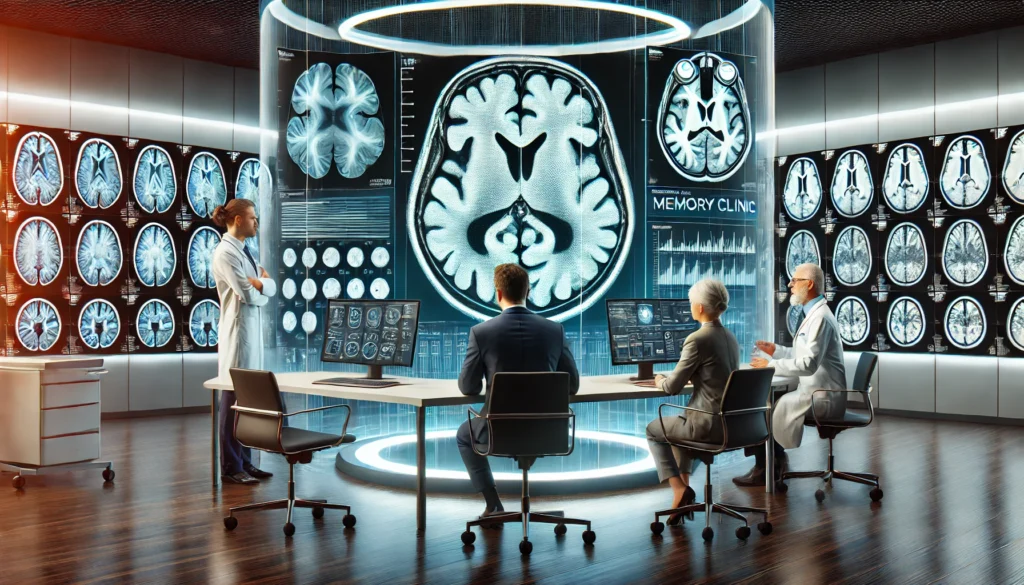Memory loss is not a one-size-fits-all condition; it can vary in severity and underlying causes. From the minor forgetfulness that comes with aging to the more severe and debilitating forms found in dementia, understanding the nature of memory loss is crucial.
You may also like: Tips to Improve Low Average Memory Performance
Types of Memory Loss
Memory loss can manifest in different forms, each with its characteristics. Short-term memory loss involves forgetting recent events or information, while long-term memory loss affects older memories. Transient memory loss is temporary and often linked to stress or fatigue, whereas progressive memory loss indicates worsening conditions, such as Alzheimer’s. Recognizing these types helps in identifying the underlying causes. Memory care requirements can vary depending on the type and severity of cognitive impairment. Learning about the necessary levels of care can help in making informed decisions for long-term management.
Stages of Memory Loss
Memory loss can progress through various stages, from mild cognitive impairment to severe dementia. Early-stage symptoms may include forgetfulness and trouble with complex tasks. As it advances, individuals may struggle with daily activities and personal history. Severe memory loss can lead to an inability to recognize familiar people and environments, requiring comprehensive care.
Effects on Daily Life
Memory loss impacts more than just the ability to recall information; it can affect communication, decision-making, and independence. Individuals may experience frustration, anxiety, and a loss of confidence. Loved ones often notice changes in behavior and personality, which can strain relationships. In senior living communities, specialized memory care programs help residents maintain cognitive function while offering a supportive environment. Understanding these options can provide reassurance to families seeking structured care.
Common Causes of Memory Loss
Memory loss can arise from various conditions, including:
- Alzheimer’s Disease: A progressive neurodegenerative disorder characterized by memory loss, cognitive decline, and behavioral changes. It is the most common cause of dementia, with symptoms gradually worsening over time.
- Vascular Dementia: Results from reduced blood flow to the brain, often after a stroke. It leads to cognitive difficulties and memory problems, often presenting in a stepwise progression.
- Lewy Body Dementia: Associated with abnormal protein deposits in the brain. It can cause memory loss, hallucinations, and motor symptoms similar to Parkinson’s disease.
- Traumatic Brain Injury: Can result from accidents or sports injuries, affecting memory and cognitive function. The impact on memory can vary based on the severity and location of the injury.
- Psychological Factors: Stress, depression, and anxiety can also contribute to memory problems. These conditions may affect concentration and the ability to store and retrieve information.
Seeking medical advice for memory concerns is essential to determine whether the cause is psychological or neurological. A qualified memory specialist can provide appropriate guidance based on individual symptoms.
Types of Memory Specialists
When searching for a “memory specialist near me,” it’s important to first recognize the different types of healthcare providers who specialize in addressing memory-related problems. These professionals can vary significantly in their qualifications and areas of expertise, which can directly influence the kind of support and care they offer. Understanding these distinctions will help you identify the most appropriate specialist to meet your specific needs and concerns regarding memory issues. By taking the time to familiarize yourself with these roles, you can make a more informed decision about who might be best equipped to assist you or a loved one in navigating challenges related to memory.
Neurologists
Neurologists specialize in disorders of the nervous system, including the brain. They are often the primary point of contact for diagnosing and treating memory loss. For older adults, consulting a geriatric psychiatrist alongside a neurologist can offer a more comprehensive approach. These specialists help address both neurological and psychiatric aspects of cognitive decline.
When you begin your search for a neurologist who specializes in memory loss, starting with the phrase “neurologist for memory loss near me” can be quite effective. This approach helps to identify healthcare professionals who possess the necessary expertise in assessing and treating various neurological conditions, including those that affect memory.
When you utilize this specific search term, you will have the opportunity to locate qualified specialists who are practicing within your local vicinity. These professionals possess the expertise to conduct a comprehensive evaluation of your individual concerns, taking into account all relevant factors. Furthermore, they can collaborate with you to create a personalized treatment plan that is specifically designed to address your unique needs and circumstances. This approach ensures that you receive the most appropriate care and support for your situation.
This first step is extremely important because it lays the groundwork for receiving the right kind of care for any memory-related problems you might be facing. Taking this action helps ensure that healthcare professionals can evaluate your situation properly and determine the best course of action tailored specifically to your needs. Whether you are noticing slight changes in your memory or more significant concerns, starting this process is vital for addressing these issues effectively.
Areas of Expertise
Neurologists are trained to assess brain function and diagnose neurological disorders. They use techniques like MRI scans and EEGs to identify abnormalities. Their expertise extends to conditions like epilepsy, migraines, and multiple sclerosis, which can also impact memory.
Role in Treatment
Once a diagnosis is established, neurologists develop a treatment plan. This may include medications to manage symptoms, lifestyle recommendations, and referrals to other specialists. They monitor progress and adjust treatment as necessary.

When to Consult a Neurologist
Consider seeing a neurologist if memory loss is accompanied by other neurological symptoms like seizures or numbness. They are essential when initial assessments suggest a neurological cause for memory decline. In some cases, memory care facilities provide additional support when neurological conditions become more complex. Finding the right facility ensures that individuals receive specialized attention tailored to their needs.
Geriatricians
Geriatricians are physicians who focus on the health care of older adults. They are well-versed in age-related memory issues and can provide valuable insights and treatment options.
Understanding Aging and Memory
Geriatricians have a deep understanding of how aging affects memory. They differentiate between normal age-related changes and pathological conditions like dementia. Their holistic approach considers physical, emotional, and social aspects of aging.
Comprehensive Assessments
Geriatricians perform thorough evaluations, including physical exams, cognitive tests, and medication reviews. They assess for other health issues that may affect memory, such as cardiovascular disease or diabetes.
Tailored Interventions
They offer personalized interventions, which may include medication adjustments, dietary changes, and exercise regimens. Their goal is to enhance quality of life and maintain independence for as long as possible.
Psychiatrists
Psychiatrists can be instrumental in diagnosing and treating memory loss related to mental health conditions such as depression or anxiety. They can offer medication and therapy as part of a comprehensive treatment plan. Accessing memory care services in specific regions can enhance treatment outcomes by providing structured support. Certain facilities specialize in psychiatric care alongside memory-focused interventions.
Mental Health and Memory
Psychiatrists understand the interplay between mental health and memory. Conditions like depression can mimic or exacerbate memory loss. They assess for underlying psychiatric disorders that may contribute to cognitive decline.
Therapeutic Approaches
They use a range of therapies, including cognitive-behavioral therapy, to address memory-related issues. Medications like antidepressants or anxiolytics may be prescribed to alleviate symptoms affecting memory.
Collaborative Care
Psychiatrists often work alongside neurologists and geriatricians to provide integrated care. They contribute to a multidisciplinary approach, ensuring that mental health aspects are addressed in the overall treatment plan.
Neuropsychologists
These specialists evaluate cognitive function and can help determine the extent and nature of memory impairment. They are essential for creating a detailed cognitive profile through various tests.
Cognitive Assessments
Neuropsychologists use standardized tests to assess various cognitive domains, including memory, attention, and problem-solving. These assessments help identify specific deficits and strengths.

Diagnostic Clarity
Their evaluations provide diagnostic clarity, distinguishing between different types of dementia and other cognitive disorders. This information is critical for developing targeted interventions.
Rehabilitation Strategies
Based on assessment results, neuropsychologists develop cognitive rehabilitation programs. These strategies aim to improve or compensate for memory deficits, enhancing daily functioning.
Memory Disorder Clinics
Searching for a “memory disorder clinic” can lead you to specialized centers that offer comprehensive diagnostic and therapeutic services for memory-related conditions. Many memory care facilities provide dedicated services that align with clinical assessments and personalized treatment plans. Understanding regional options can help families choose the most suitable care setting.
Multidisciplinary Approach
Memory disorder clinics bring together various specialists, including neurologists, geriatricians, and neuropsychologists. This collaborative environment ensures comprehensive care.
Advanced Diagnostic Tools
These clinics often have access to advanced diagnostic tools, such as PET scans and genetic testing. These technologies aid in early and accurate diagnosis, guiding treatment decisions.
Tailored Care Plans
Clinics develop individualized care plans based on thorough assessments. They offer a range of services, from medication management to cognitive therapy, tailored to each patient’s needs.
How to Choose the Right Specialist
Choosing the right specialist involves considering several factors to ensure the best care possible.
Credentials and Experience
Review the credentials and experience of potential specialists. Look for board certifications, years of practice, and any subspecialties they may have.
Importance of Board Certification
Board certification indicates that a specialist has met rigorous standards in their field. It assures you of their expertise and commitment to ongoing education.
Evaluating Experience
Consider the specialist’s experience with memory-related conditions. Those with extensive experience are likely to be more adept at diagnosing and treating complex cases.
Subspecialties and Special Interests
Some specialists may have subspecialties or special interests, such as geriatric neurology or behavioral neurology. These can offer added value, especially in complex cases.
Recommendations and Reviews
Seek recommendations from primary care physicians, friends, or family who have had similar experiences. Online reviews can also provide insight into the reputation and effectiveness of a specialist.
Personal Referrals
Personal referrals offer firsthand insights into a specialist’s approach and effectiveness. They can provide a sense of trust and reassurance when making your choice.
Online Reviews and Ratings
Online platforms provide reviews and ratings from other patients. Look for consistent feedback on their communication skills, professionalism, and treatment outcomes.
Consulting Your Primary Care Physician
Your primary care physician can offer valuable recommendations based on their knowledge of your medical history and needs. They may suggest specialists they trust and have worked with before.
Accessibility and Convenience
Consider the location, availability of appointments, and whether the specialist accepts your insurance. Searching for “memory doctors near me” can help find options within a reasonable distance. For individuals in Washington, for instance, memory care facilities in Tacoma provide a range of specialized services tailored to cognitive health needs. Finding a well-located facility can ensure easy access to quality care and minimize travel burdens.
Proximity and Travel Considerations
Choose a specialist whose location is convenient for regular visits. Proximity reduces travel stress and ensures that you can attend appointments consistently.
Appointment Availability
Check the specialist’s availability for new patients and wait times for appointments. Timely access is crucial, especially when dealing with progressive memory loss.
Insurance and Financial Considerations
Ensure the specialist accepts your insurance plan to avoid unexpected expenses. Exploring different memory care payment options can help families plan for long-term care costs. Financial preparedness is crucial in securing continuous and quality treatment.
Personal Comfort and Communication
It’s important to feel comfortable with the specialist, as open communication is crucial in managing health conditions. During initial consultations, assess whether the specialist listens to your concerns and explains things clearly.
For those requiring residential care, selecting the right elderly care home is just as important as choosing a specialist. Facilities with trained professionals can provide ongoing cognitive and medical support.

Building Rapport
A good rapport with your specialist fosters trust and openness. Assess their willingness to listen and address your concerns during consultations.
Clarity and Transparency
Ensure the specialist explains medical information and treatment options clearly. Transparency about potential risks and benefits is vital for informed decision-making.
Ongoing Communication
Effective communication extends beyond initial visits. A specialist who encourages questions and provides updates on your progress is invaluable in long-term care. For additional support, adult sitter services can assist in monitoring individuals with memory challenges. These services provide companionship and supervision, reducing caregiver stress.
Current Trends and Future Implications
Memory care is an evolving field with continuous research and technological advancements.
Advances in Diagnostic Tools
Recent developments in imaging and blood tests are making earlier and more accurate diagnoses possible. These advances are crucial for conditions like Alzheimer’s, where early intervention can be beneficial.
Imaging Technologies
Advancements in imaging, such as MRI and PET scans, offer detailed views of brain structures and functions. These tools help detect changes associated with memory disorders at an earlier stage.
Biomarker Research
Biomarkers in blood and cerebrospinal fluid are becoming valuable in diagnosing memory disorders. They provide insights into disease progression and response to treatment.
Genetic Testing
Genetic testing is gaining traction in identifying predispositions to memory disorders. It aids in risk assessment and personalized treatment planning.
Emerging Therapies
Innovative therapies, including cognitive training programs, pharmacological treatments, and lifestyle interventions, are being explored to enhance memory and cognitive function. Exploring the best memory care options ensures that individuals receive the latest therapeutic advancements. A well-structured care plan can significantly improve quality of life and slow cognitive decline.
Cognitive Rehabilitation
Cognitive training programs focus on enhancing memory, attention, and problem-solving skills. These interventions are tailored to individual needs and can slow cognitive decline.
Pharmacological Advances
New medications are being developed to target underlying disease mechanisms. These drugs aim to slow progression and improve symptoms, offering hope for better management.
Lifestyle Interventions
Research highlights the impact of lifestyle factors on memory health. Diet, exercise, and social engagement are integral to maintaining cognitive function and preventing decline.
The Role of Technology
Technological innovations are revolutionizing the healthcare landscape in multiple ways, particularly through advancements like telemedicine and various digital health applications. These tools are not only enhancing access to medical care for a broader population but are also providing valuable methods for more effectively monitoring and assessing cognitive health. This shift is making it easier for individuals to receive timely consultations and support without the barriers often associated with traditional healthcare settings, such as geographical distance or scheduling conflicts. By leveraging these technologies, both patients and healthcare providers can engage in more proactive and continuous management of cognitive health issues, ultimately leading to better overall outcomes for individuals.
Beyond healthcare applications, technology also plays a key role in creating dementia-friendly homes that enhance safety and accessibility. Smart home systems and adaptive environments help individuals maintain independence for longer.
Telemedicine and Remote Care
Telemedicine expands access to specialists, especially in remote areas. It enables regular follow-ups and consultations from the comfort of home.
Digital Health Apps
Apps designed for cognitive health offer memory exercises and tracking tools. They empower individuals to monitor progress and engage in brain-stimulating activities.
Wearable Technology
Wearables, like smartwatches, provide continuous monitoring of vital signs and activity levels. They offer data that can inform treatment decisions and lifestyle modifications.

Practical Advice for Patients and Caregivers
Dealing with memory loss requires a proactive approach. A well-structured dementia caregiver’s guide can help families understand effective strategies for daily care. Learning about behavioral management techniques can improve caregiving outcomes.
Early Assessment
Don’t delay seeking an assessment if you notice memory issues. Early diagnosis can lead to better management.
Recognizing Early Signs
Pay attention to subtle changes in memory and cognition. Early signs, such as frequent forgetfulness or difficulty with familiar tasks, warrant evaluation.
Seeking Professional Evaluation
Consult a specialist promptly for a thorough assessment. Early intervention can slow progression and improve quality of life.
Importance of Timely Action
Addressing memory concerns early allows for more effective planning and treatment. It provides an opportunity to explore options and make informed decisions.
Stay Informed
Keep abreast of new research and treatments in the field of memory care.
Engaging with Research
Stay updated on the latest studies and findings related to memory disorders. Understanding research developments can inform treatment choices.
Exploring Treatment Options
Regularly review available treatments and therapies. Discuss new options with your specialist to determine their suitability.
Connecting with Support Networks
Join online communities and support groups to share experiences and learn from others. These networks offer valuable insights and encouragement.
Lifestyle Modifications
Engage in activities that promote brain health, such as regular exercise, a balanced diet, and mental stimulation. Quality care services can further support a holistic approach to cognitive health by integrating lifestyle-based interventions. These services provide structured routines that reinforce mental and physical well-being.
Physical Activity
Regular exercise improves blood flow to the brain and supports cognitive health. Aim for a mix of aerobic and strength-training activities.
Nutritional Considerations
Adopt a balanced diet rich in omega-3 fatty acids, antioxidants, and vitamins. Foods like fish, fruits, and vegetables support brain function.
Mental and Social Engagement
Challenge your brain with puzzles, reading, and learning new skills. Social interactions and hobbies also stimulate cognitive processes.
Support Systems
Join support groups for patients and caregivers to share experiences and advice. For individuals needing continuous supervision, a memory care nursing home can provide structured and professional support. These facilities offer specialized programs designed to enhance cognitive function and daily living skills.
Peer Support and Shared Experiences
Support groups provide a platform to connect with others facing similar challenges. Sharing experiences can alleviate feelings of isolation.
Resources for Caregivers
Caregivers benefit from resources and strategies shared within support networks. Practical advice on managing daily tasks and emotional support is invaluable.
Professional Support Services
Consider professional services, such as counseling or respite care, to support both patients and caregivers. These services offer guidance and relief from caregiving responsibilities.

Conclusion
Finding the right specialist for memory loss involves understanding the types of professionals available and what they offer. By carefully considering your needs and the expertise of different specialists, you can find the right partner in managing memory loss.
It is important to remain updated on the most recent trends and advancements in technology, particularly because these developments can significantly improve the quality of care and management for individuals dealing with memory-related conditions. Keeping abreast of new findings and tools can not only empower caregivers and health professionals but also provide valuable resources for those affected by these challenges. By understanding the latest innovations, you can better navigate the complexities of treatment options and support systems available today.
Through proactive engagement, informed decision-making, and support from healthcare professionals, individuals and families can navigate the challenges of memory loss effectively.
Further Reading:
Memory loss: When to seek help
Important Note: The information contained in this article is for general informational purposes only, and should not be construed as health or medical advice, nor is it intended to diagnose, prevent, treat, or cure any disease or health condition. Before embarking on any diet, fitness regimen, or program of nutritional supplementation, it is advisable to consult your healthcare professional in order to determine its safety and probable efficacy in terms of your individual state of health.
Regarding Nutritional Supplements Or Other Non-Prescription Health Products: If any nutritional supplements or other non-prescription health products are mentioned in the foregoing article, any claims or statements made about them have not been evaluated by the U.S. Food and Drug Administration, and such nutritional supplements or other health products are not intended to diagnose, treat, cure, or prevent any disease.


